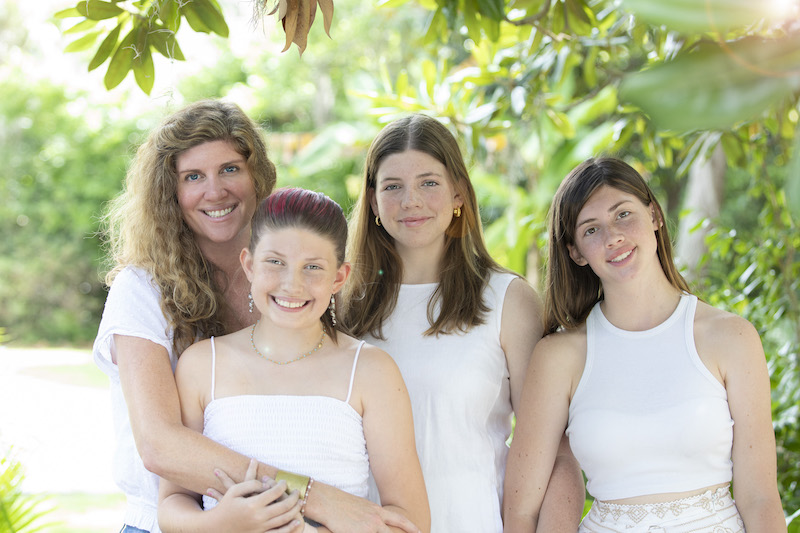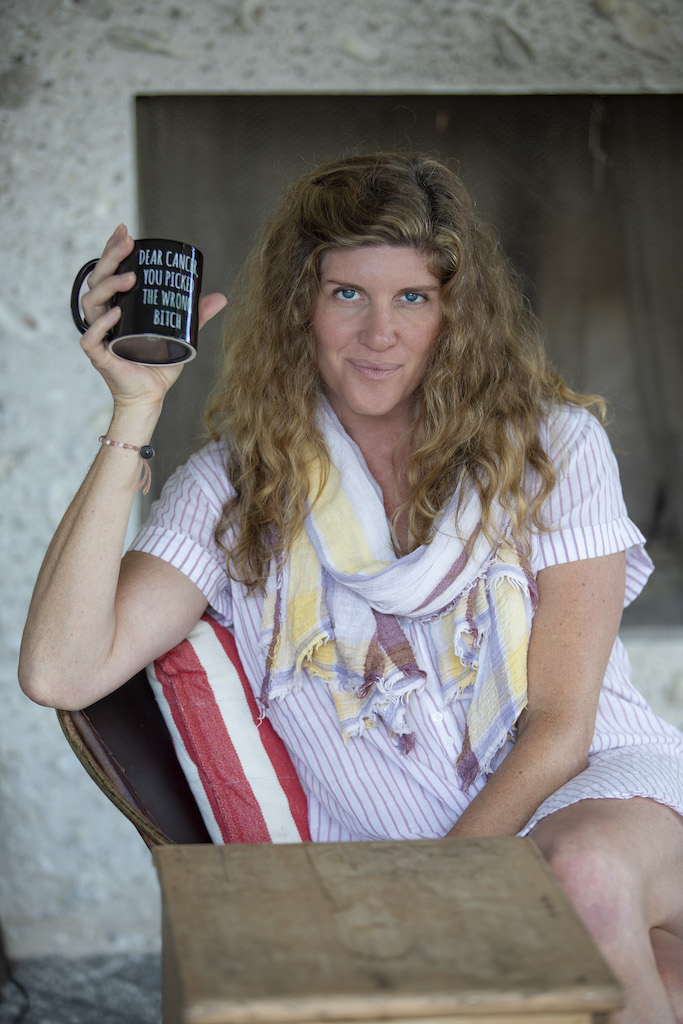There’s something I want to tell you. Something I need to get off my chest. I am a breast cancer survivor.
Please know, this is difficult for me to say out loud. To admit. To acknowledge. This hard-fought honor is not a medal or badge anyone seeks to earn. And yet, many of us must earn it. Because one in eight women in the United States will develop invasive breast cancer over the course of her lifetime, you probably know someone—maybe a relative, close friend, neighbor or your child’s favorite teacher—who is battling or has battled breast cancer.
My fight began innocuously, with my morning routine Friday, March 4 at 6 a.m. I had already made the decision to get my breast implants removed and was scheduled for surgery April 1. That fateful March morning I was excitedly thinking about my upcoming explant when I got in the shower and then suddenly felt compelled to do a self-breast exam. I do not know if it was intuition, divine intervention, luck or a combination of all the above, but my hand, as if guided, went directly to a hard, unforgiving lump on my right breast. Time froze. I froze. My index and middle fingers pressing into something that though inside of me was so alien to me. I had just had a 3D mammogram in October. This could not be what I instinctively knew it was: cancer.
Despite the early hour, I texted my friend Dr. William Burak, an amazing breast surgeon at Memorial Health, and then shortly thereafter Angie Gillespie, R.T(R)(M) CN-BI, who is also a dear friend and the breast imaging navigator for Hilton Head Hospital and Bluffton Medical (and equally amazing at her job). By 10 a.m., it was one diagnostic test after another: 3D mammogram, ultrasound and then biopsy. By noon it was not a matter of if I had cancer but what type—and how bad. Thank God I had Dr. Burak and Angie and other dear friends like Dr. Brandon Runyan by my side over the next few days as I received the final diagnosis: stage 1, grade 2, estrogen positive, progesterone positive, HER2 negative, mucinous carcinoma.
March 28, Dr. Burak and Dr. Campbell of the Georgia Institute for Plastic Surgery performed my lumpectomy, implant removal and reconstruction, and on May 25, after 15 rounds of radiation at Mayo Clinic in Jacksonville, I rang the bell to celebrate the end of my breast cancer treatment. Throughout my health journey, I recorded the takeaways I thought were most beneficial and that I should share with all the women (and men) who will be diagnosed with breast cancer, too. Some of the takeaways are funny, some poignant, and some somewhere in between. But all are game-changers.

Underwear
I’ll start with funny. Always wear panties to medical appointments. This may seem obvious but, as someone who spends most of her life in either a tennis skirt, lined running shorts or yoga pants, I’m not much of an underwear-er. So, I learned this one the hard way during my CT scan. (My apologies to the tech who learned way too much about me that day.) Because hospital gowns are about the most poorly designed garment in existence, I highly encourage anyone to include a spare pair in their quick grab hospital bag (as well as all medical and insurance information in a binder or folder, some form of entertainment and a wrap or scarf). And while we are on the subject of clothing, don’t wear a romper, dress or one piece of any sort to appointments. You’ll end up essentially naked. This is a top (as in a button down or zip up shirt) and bottom affair, and because most hospitals and medical offices are cold, I would opt for comfortable pants.
Connections
Connect with other breast cancer patients and survivors. Whether you reach out to someone you know who has been affected by breast cancer or you make friends with the other women in the waiting room of your doctor’s office, these women will support and empower you. They are the ones who have or are currently going through your same ordeal and empathize without pitying you. They give you honest feedback and recommendations about healthcare facilities and professionals and insightful solutions to issues like anxiety, radiation rash, and talking to your children about your diagnosis. It was Christy Simpson who introduced me to the husband pillow, your “breast friend” when you have to rest upright post lumpectomy or mastectomy. It was Julie Richardson who told me about Miaderm cream for radiation and other must-have products. She also gifted me “The Cancer-Fighting Kitchen” cookbook. And it was Meg Meccariello who told me the next and maybe the most grace saving takeaway.
Grief
On one of our many conversations early on in my diagnosis Meg said to me, “Becca, know you will go through the stages of grief, so be kind to yourself.” Her words could not have been more true. If you are unfamiliar with the seven stages of grief, they are shock, denial, anger, bargaining, depression, testing, and acceptance. You will not experience all these stages sequentially. Nor will you simply experience a stage and then move on. For me, I would cycle through all seven, with anxiety (rather than depression) being the most consistent.
Honesty
Because of the influx of feelings and emotions, it is crucial to be honest with the people around you about your mental and physical state. This includes your children. People will tell you you’re strong, and maybe you are, but you don’t have to be. There were days in the beginning I would wake and throw up from anxiety and then be unable to eat breakfast with my family. I would tell my daughters that eventually I would be fine but that this was the physical manifestation of my anxiety. We would talk about the effects of anxiety and how, when you feel this anxious, it is important to seek help (which I did) and to practice breathing and mediation exercises. Even though my husband is an attentive, caring man, I would also directly let him know my headspace and what I needed from him in terms of support. I had to also set boundaries with people who, though well-meaning, would “research” cancer and make recommendations.
Filtering
Which brings me to a sanity saver: Filter out the noise and try to listen to your inner voice. This can be very difficult. Trust me. I was told by one person that the only way I was going to survive breast cancer was by devoting myself to Christ. Another person told me my cancer was from getting the COVID vaccine (which I received in 2021, and my tumor, which was undetected by 3D mammograms for two years, began growing in 2020). Another tried to convince me I needed to get a double mastectomy and hysterectomy. And yet another told me to avoid all surgeries, radiation and medications and opt for energy healing with crystals and herbal supplementation. Yes, everyone’s heart is in the right place, but it is your heart that needs to be followed.
Intuition+Research
Your intuition alongside responsible research will ultimately get you through your breast cancer. There is no better advocate for your positive outcome than you and the power within you. Once you get your diagnosis, I do not recommend consulting Dr. Google. Instead, fortify your knowledge of your disease and design your cancer plan with the help of the medical professionals as well as other breast cancer resources and survivors that most align with your beliefs and make you feel most safe.
Having shared these takeaways, there’s something else I need to get off my chest. Though I am breast cancer-free, I am not free from cancer. Moving forward, cancer will always be a part of my life. Yes, I will be on tamoxifen for the next five years and will need to be monitored regularly for the foreseeable future, but more than that, cancer is now in my mental DNA. I will be having a normal day and then a psychological rogue wave will hit me, and I’ll think, “What the frittata! I’m a breast cancer survivor?” Or, “Holy shiitake! Am I going to get cancer again?”
I should also tell you that throughout my health event I never had a religious epiphany, and I am not a necessarily better person because of mucinous carcinoma. Yes, going into my treatment, I did have high hopes of reading spiritual books and “working on myself” through journaling and introspection, but in reality, I just did what I needed to do to survive.
I did, however, ultimately discover a part of me that may have been dormant or I may have neglected for many years. Maybe decades. I can dig deep and triumph through adversity. We all can.
Becca Edwards is a wellness professional, freelance writer, and owner of Female IQ (femaleIQ.com).
Breast Cancer Facts
- For women in the U.S., breast cancer death rates are higher than those for any other cancer, besides lung cancer.
- As of January 2022, there are more than 3.8 million women with a history of breast cancer in the U.S. This includes women currently being treated and women who have finished treatment.
- Breast cancer is the most commonly diagnosed cancer among American women. In 2022, it’s estimated that about 30 percent of newly diagnosed cancers in women will be breast cancers.
- In women under 45, breast cancer is more common in Black women than white women. Overall, Black women are more likely to die of breast cancer. For Asian, Hispanic, and Native-American women, the risk of developing and dying from breast cancer is lower. Ashkenazi Jewish women have a higher risk of breast cancer because of a higher rate of BRCA mutations.
- About 85% of breast cancers occur in women who have no family history of breast cancer. These occur due to genetic mutations that happen as a result of the aging process and life in general, rather than inherited mutations.
resource: breastcancer.org


